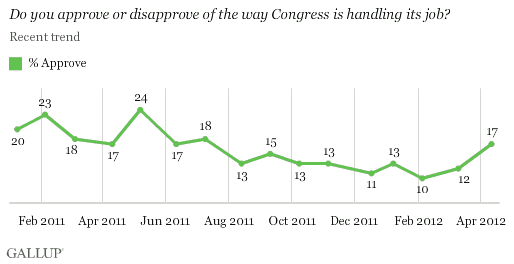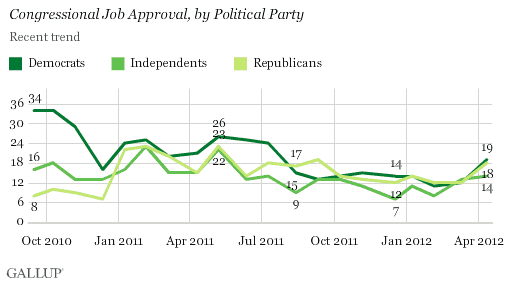PRINCETON, NJ -- Americans still hold Congress in low regard, but its 17% job approval rating is the highest since last July. Congress' approval had dipped to a record-low 10% in February.

Gallup's monthly update of Americans' views of Congress, conducted April 9-12, finds Congress' disapproval rating at 79%, also the lowest since last July. Disapproval had reached a record high of 86% in December 2011 and February.
Congress' approval rating had not shown significant improvement in February or March, in contrast to the increases Gallup documented in Americans' satisfaction with the way things are going in the United States and their confidence in the economy. Americans' generally improving mood may now be extending to their views of Congress. However, national satisfaction and economic confidence seem to have leveled off this month rather than continuing to improve.
Congressional approval increased this month among both Republicans, from 12% to 18%, and Democrats, from 12% to 19%. Independents' ratings are essentially unchanged from March (13%, versus 14% now), but are up from 8% in February.

Republicans' and Democrats' ratings of Congress have generally been similar during the last two years with divided party control of Congress, as Republicans have a majority in the House of Representatives and Democrats in the Senate. When one party has control of both houses of Congress, as Democrats did from 2007-2010, there typically is a wide gap in party ratings of Congress.
Implications
Americans are now less negative toward Congress than at any point since last summer, though they still widely disapprove of the job the institution is doing. Since this is an election year for the president, all members of the U.S. House, and roughly one-third of U.S. senators, the political environment makes it doubtful that Congress will be able to pass major legislation to deal with the biggest problems facing the country, at least until the Nov. 6 election. Thus, it is unlikely that any action Congress itself takes will lead to further improvement in its approval ratings through the early fall.
Rather, the direction of congressional approval over the coming months will more likely be contingent on the state of the economy. However, election politics could play a role, particularly if President Obama makes running against Congress a prominent part of his campaign.
Survey Methods
Results for this Gallup poll are based on telephone interviews conducted April 9-12, 2012, with a random sample of 1,016 adults, aged 18 and older, living in all 50 U.S. states and the District of Columbia.
For results based on the total sample of national adults, one can say with 95% confidence that the maximum margin of sampling error is ±4 percentage points.
Interviews are conducted with respondents on landline telephones and cellular phones, with interviews conducted in Spanish for respondents who are primarily Spanish-speaking. Each sample includes a minimum quota of 400 cell phone respondents and 600 landline respondents per 1,000 national adults, with additional minimum quotas among landline respondents by region. Landline telephone numbers are chosen at random among listed telephone numbers. Cell phone numbers are selected using random-digit-dial methods. Landline respondents are chosen at random within each household on the basis of which member had the most recent birthday.
Samples are weighted by gender, age, race, Hispanic ethnicity, education, region, adults in the household, and phone status (cell phone only/landline only/both, cell phone mostly, and having an unlisted landline number). Demographic weighting targets are based on the March 2011 Current Population Survey figures for the aged 18 and older non-institutionalized population living in U.S. telephone households. All reported margins of sampling error include the computed design effects for weighting and sample design.
In addition to sampling error, question wording and practical difficulties in conducting surveys can introduce error or bias into the findings of public opinion polls.
View methodology, full question results, and trend data.
For more details on Gallup's polling methodology, visit www.gallup.com.
